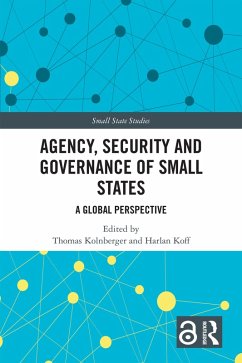
Technology and Agency in International Relations (eBook, ePUB)
Versandkostenfrei!
Sofort per Download lieferbar
39,95 €
inkl. MwSt.
Weitere Ausgaben:

PAYBACK Punkte
20 °P sammeln!
This book responds to a gap in the literature in International Relations (IR) by integrating technology more systematically into analyses of global politics.Technology facilitates, accelerates, automates, and exercises capabilities that are greater than human abilities. And yet, within IR, the role of technology often remains under-studied. Building on insights from science and technology studies (STS), assemblage theory and new materialism, this volume asks how international politics are made possible, knowable, and durable by and through technology. The contributors provide empirically rich ...
This book responds to a gap in the literature in International Relations (IR) by integrating technology more systematically into analyses of global politics.
Technology facilitates, accelerates, automates, and exercises capabilities that are greater than human abilities. And yet, within IR, the role of technology often remains under-studied. Building on insights from science and technology studies (STS), assemblage theory and new materialism, this volume asks how international politics are made possible, knowable, and durable by and through technology. The contributors provide empirically rich and pertinent accounts of a variety of technologies relevant to the discipline, including drones, algorithms, satellite imagery, border management databases, and blockchains.
Problematizing various technologically mediated issues, such as secrecy, violence, and questions of how authority and evidence become constituted in international contexts, this book will be of interest to scholars in IR, in particular those who work in the subfields of (critical) security studies, International Political Economy, and Global Governance.
Chapter 7 of this book is freely available as a downloadable Open Access PDF at http://www.taylorfrancis.com under a Creative Commons Attribution-Non Commercial-No Derivatives (CC-BY-NC-ND) 4.0 license.
Technology facilitates, accelerates, automates, and exercises capabilities that are greater than human abilities. And yet, within IR, the role of technology often remains under-studied. Building on insights from science and technology studies (STS), assemblage theory and new materialism, this volume asks how international politics are made possible, knowable, and durable by and through technology. The contributors provide empirically rich and pertinent accounts of a variety of technologies relevant to the discipline, including drones, algorithms, satellite imagery, border management databases, and blockchains.
Problematizing various technologically mediated issues, such as secrecy, violence, and questions of how authority and evidence become constituted in international contexts, this book will be of interest to scholars in IR, in particular those who work in the subfields of (critical) security studies, International Political Economy, and Global Governance.
Chapter 7 of this book is freely available as a downloadable Open Access PDF at http://www.taylorfrancis.com under a Creative Commons Attribution-Non Commercial-No Derivatives (CC-BY-NC-ND) 4.0 license.
Dieser Download kann aus rechtlichen Gründen nur mit Rechnungsadresse in A, B, BG, CY, CZ, D, DK, EW, E, FIN, F, GR, HR, H, IRL, I, LT, L, LR, M, NL, PL, P, R, S, SLO, SK ausgeliefert werden.













